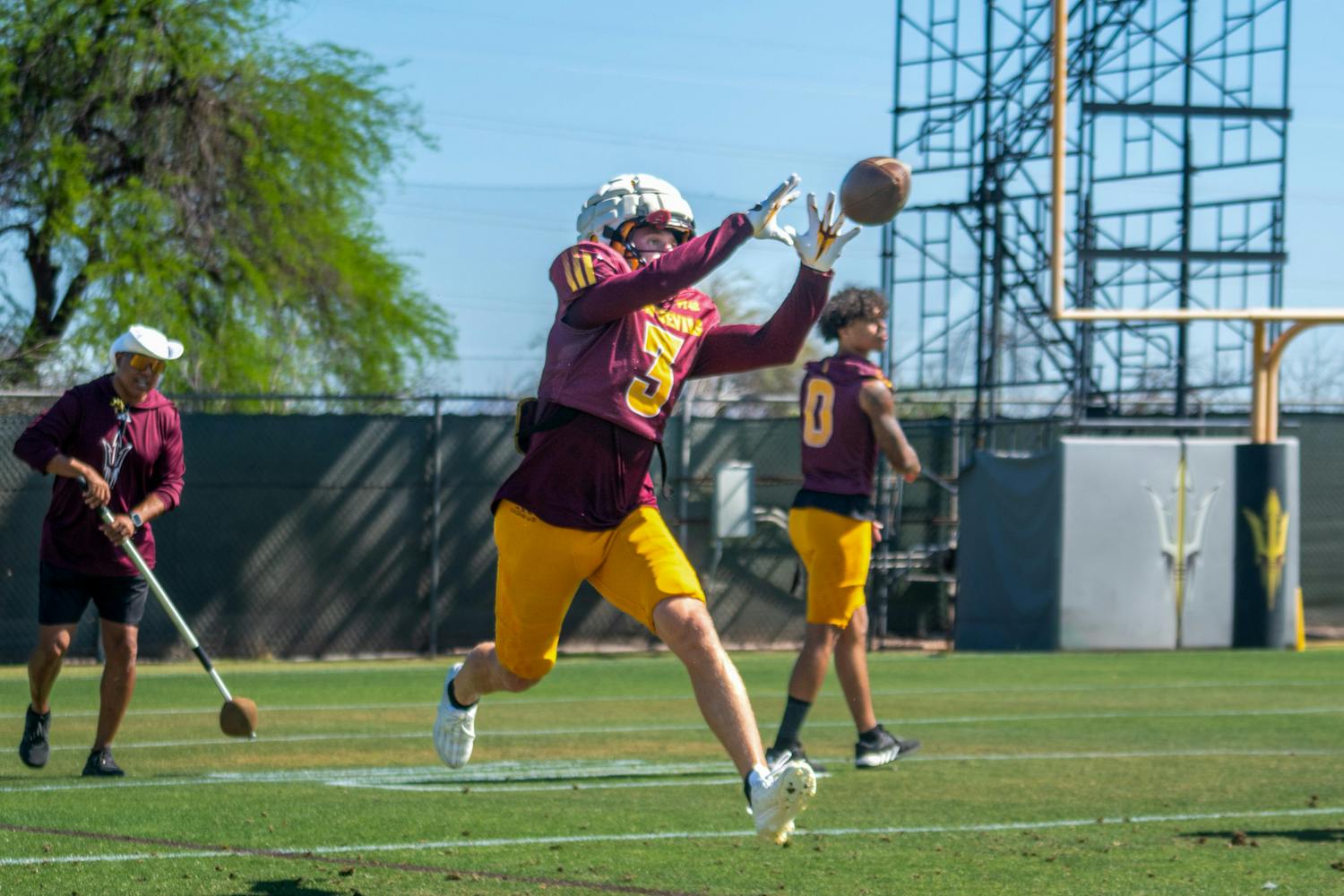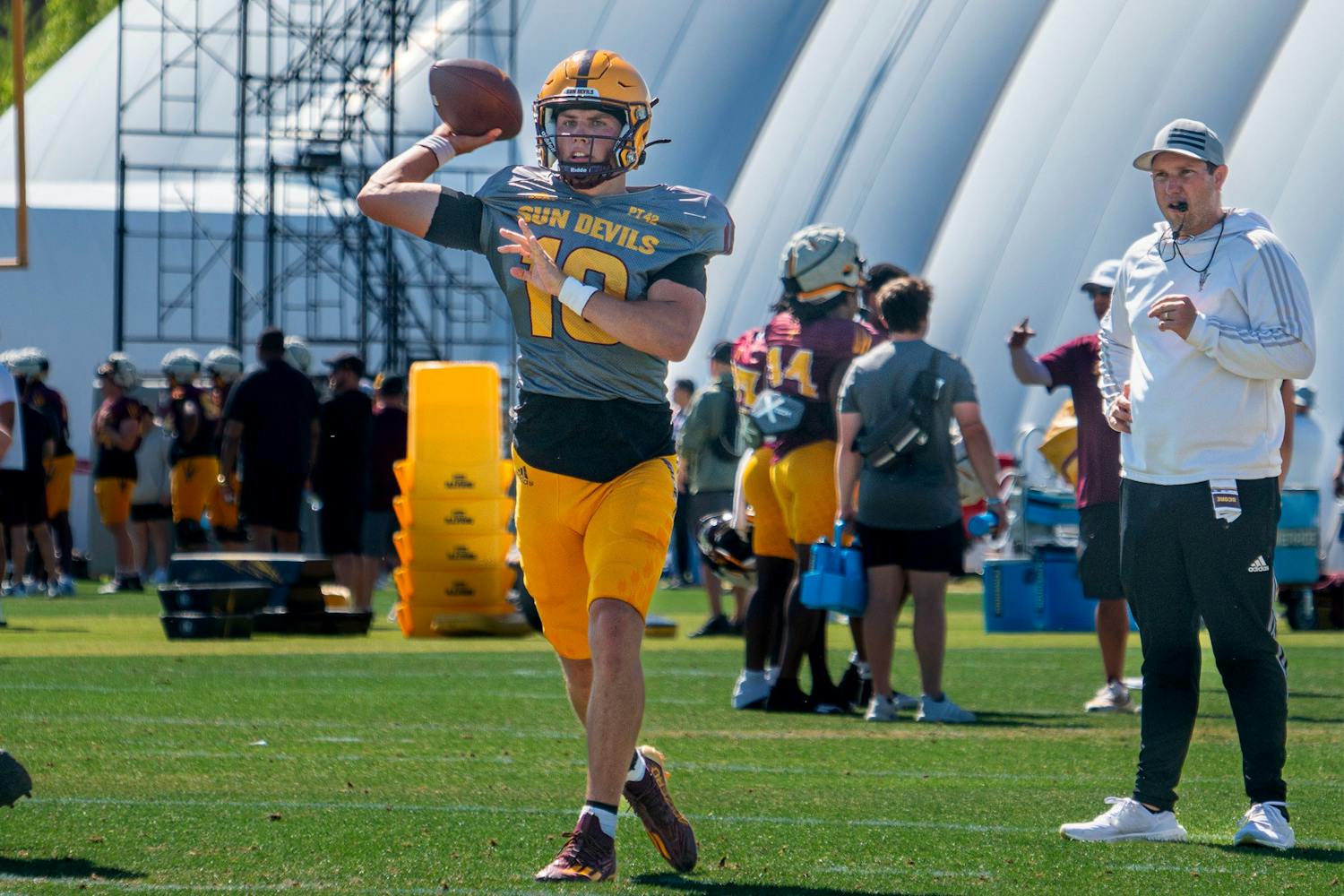“Get ‘em hot, Higgy!”
It’s a warm March day at Phoenix Muni, and ASU baseball head coach Tracy Smith wants his pitchers ready to go at game-speed for a live throwing session.
Junior designated hitter RJ Ybarra waits outside the batting cage, eager to step into the box.
Out to the mound jogs freshman left-hander Tucker Baca from behind a makeshift bullpen in short right field, marked by two protective screens that act as a backstop.
He battles back against freshman outfielder Coltin Gerhart, going hard inside and forcing him to foul off two pitches after throwing three straight balls, but allows a walk.
After facing his quota of hitters, pitching coach Brandon Higelin pulls Baca aside.
He reminds him that his slider and fastball were filthy. But as many young pitchers discover, Baca hadn’t been throwing his changeup with the same intensity and therefore made it less effective.
Sophomore right-hander Seth Martinez knows exactly why.
“(Higelin) focuses more on mechanics, and arm speed,” Martinez said. “We’re real big on arm speed this year. Last year it was more on arm strength and keeping our arms healthy. We do a lot of running to maintain that strength.”
The changes are easily measurable.
“Velocity’s all gone up so far since we’ve been here,” Higelin said. “It’s a matter of them understanding their body. I try to get each pitcher to understand what makes them good, because no two pitchers are the same.”
It’s this attention to detail that Higelin brings that attracts Sun Devil pitchers — he supplies the hunger and the drive to improve. He demands a return on his investment.
“He’s a very knowledgeable pitching guy, one of the stronger ones I think in the country,” Smith said. “He’s a younger guy, he relates well to the guys, I think they buy into him. His work ethic is tremendous, he’s not going to cut corners. I think when guys see that on a daily basis, that helps that whole chemistry piece as a pitching coach.”
Higelin oversaw an elite pitching staff in his last season at Indiana, compiling a 2.33 team ERA that was good for seventh best in the nation.
“If you’re here, you’re at Indiana, wherever, the goal to me is to work with the players you have and try to get them better,” Higelin said. “The talent at Indiana was great, and that’s why they’re good this year. Here we have a great staff, and it’s an honor to work with such good kids and gifted players.”
Now, with names like Ryan Kellogg and Brett Lilek, he’s in charge of gearing up his rotation to compete in the Pac-12, arguably the country’s deepest conference in terms of pitching depth.
“He definitely takes his time to make sure each pitch is perfect,” Martinez said. “Just making sure that each pitcher knows to throw with good mechanics.”
The rotation shakeup may have surprised some, but the decision-making behind it coincides with the “next-man up” philosophy that everyone is accountable and should be prepared to make a difference.
“All those guys are Friday guys, I don’t think the way they pitch makes them any different,” Higelin said. “If you build a program correctly, the younger guys can pick the brains of the older guys and learn from them so it makes everyone better down the road.”
Baca chatted with Martinez after throwing and inquired about how to make his changeup grip more deceptive and keep hitters honest, with opposing coaches and baserunners scouting for something to tip off the hitter at the plate.
“I preach to the older guys, ‘Be open, allow them to come up and talk,’” Higelin said. “You’d hope the older guys embrace the role of mentoring. It’s always more important to hear it from your peer than a coach. If they can see how they go about their business and work that has to go into becoming a great pitcher, it will help us for years to come up.”
Baseball is a game of mistakes. But it’s the process of self-correction and training to not make the same error twice that makes baseball such a mentally stimulating challenge.
“We compete in the zone, and that’s our main focus,” Martinez said. “Go out there and act like you’re going to get the job done – know you’re going to get the job done.”
Higelin hails from Glendale, California, and is as well-versed with the tradition and history of Pac-12 baseball as anyone wearing maroon and gold.
“You’ve got something that says ASU on your shirt or hat when you walk into a ballpark, you’re instantly going to get attention,” Smith said. “We’re still new at this, still making contacts every single day. As he develops as an assistant coach – and he’s done a good job – increasing his web, increasing his network and making sure that parlays in making connections that help us ultimately in recruiting.”
He’s also a die-hard Los Angeles Kings fan.
“I bought the NHL Center Ice, so I can watch them on the road on my tablet,” Higelin. “I watch any game I can, I absolutely follow every game.”
When the ASU hockey team begins its hybrid schedule and transition to the NCAA next season, you may see Higelin out at Oceanside Ice Arena.
“I’m excited for it,” Higelin said. “I can’t wait to go to games. I think it’s a neat thing, (Coach Greg Powers) has done a great job building the program.”
Higelin’s worked with hundreds of pitchers and been around the game of baseball a long time, which allowed him to appreciate the work of his predecessor and put his new career move into perspective.
“(Former pitching coach Ken Knutson) did a great job with these guys in the past, and I’m just happy to continue to let them do the same stuff, let them get the ball and go.”
Smith said before the start of the season that developing a core of young left-handed pitching, including Baca, Eli Lingos, Andrew Shaps and Reagan Todd would be essential to ensure a competitive program in the future.
“It’s up and down a little bit for some of them,” Higelin said. “Guys with high-end talent that are very good, they come into a situation like this and guys were very good in high school. We have an older staff, some of them have a little ways to go in getting the whole aspect of the game. But from a development standpoint, they’ve been great, they’ve been getting better every way.”
Higelin is tasked with mentoring and developing a pitching staff, but it wasn’t long ago that he was a farmhand with the San Diego Padres organization under the tutelage of veteran Dominick Johnson.
“(Johnson) had the biggest influence on my career,” Higelin said. “He was my pitching coach after I got drafted, and he mentored me in my later years.”
A playing career in professional sports doesn’t necessarily translate as smoothly to coaching as it may seem.
Years of private instructional work and ability to convey the technical tips he’s acquired place Higelin in the upper echelon of the college baseball community — a responsibility he embraces.
“Being around so many pitching coaches and big leaguers, it’s about trying to gain knowledge and pass it along. I want to make sure they can throw at peak velocity.”
Reach the reporter at smodrich@asu.edu or follow @StefanJModrich on Twitter.
Like State Press Sports on Facebook and follow @statepressport on Twitter.



